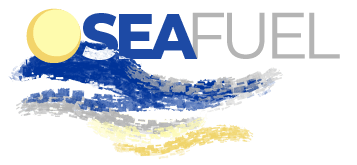The project
Sustainable integration of renewable fuels in local transportation
SEAFUEL aims to use the renewable resources across the Atlantic Area to power the local transport fleet and support the shift towards a low-carbon economy. The project will use the expertise and infrastructure of the partners in renewable energy, namely solar, wind and marine, to demonstrate the viability of hydrogen as a fuel to be used by the local transport authorities. Success of the project will promote a sustainable transport system that can be adopted by other Atlantic regions.
Scientific research
Project partners will study new materials for seawater splitting to substitute current systems and improve the efficiency.
H2 refueling station
Instalation of a fully integrated pilot plant for the production of hydrogen from renewable sources.
Implementation & results
Feasibility studies for full transport sector (public or private) conversion to SEAFUEL Hydrogen system.
Overall objective
SEAFUEL aims to demonstrate the feasibility to power local transportation networks using fuels produced by renewable energies and seawater, with no net carbon footprint as promoted by the resource-efficient flagship initiative COM(2010)2020. It will cover technical innovation by a demonstration plant, a framework for policy implementation and a sustainability analysis of production, distribution and usage of hydrogen as an alternative fuel in remote Atlantic regions. The energy required will provide from renewable resources available across the Atlantic Area such as solar, wind and marine. SEAFUEL will focus on enhancing the green growth and blue economy and paving the grounds for common renewable energy policies to promote clean and sustainable transport systems. Isolated areas such as islands face the specific challenge of the high cost of electricity and fuel and their dependency on mainland infrastructures. SEAFUEL will target these regions where 30% of fuel consumption comes from local transportation. The project will drastically reduce greenhouse emissions, PM and NO2 in line with the Clean Air programme 2008/50/EC, and provide a pathway for isolated regions to become energetically independent, leading to future installations in the other Atlantic regions. An alternative fuels model for islands will be developed to fulfil the requirements of the Partners Regional Innovation Strategies (RIS3) aimed at low carbon economy and efficient use of marine resources.
Outputs and results
Main outputs, results in line with the work plan and target groups
6 Interregional seminars targeted to local stakeholders such as transport authorities, renewable energy companies and local communities.
Technical and scientific publications available to reach the general public with reliable conclusions about the findings
Case studies that will provide a feasibility model of hydrogen powered transport network applicable to all Atlantic regions with a social, economic and environmental analysis that will quantify carbon reduction through a life cycle analysis.
5 renewable energy roadmaps to influence policy makers / regional / national and local authorities / communities / transport operators in order to modify Regional SEAPs to promote hydrogen as an Alternative Fuel Infrastructure COM(2014)94.
Cluster workshops at the 5 MS will be held with transport operators, fuel suppliers and authorities to share the conclusions of SEAFUEL and other hydrogen-based projects in Europe. Local and regional areas that are likely to implement the technology will be identified and meetings at the national level organised to influence policy makers.
A Socioeconomic analysis of hydrogen and end-use technologies in isolated communities that highlights the direct and indirect economic impacts of hydrogen.
A tool kit, which will be a guide to usability and practical application will incorporate the business model as a means of demonstrating the practicality of hydrogen and public transport.
Virtual ‘online’ tour available to visit the installation off site and learn all about the technology.
Oportunities
- Create business model from the pilot to be exported in other sites
- Feasibility study of a model of hydrogen-powered transport network, applicable to all atlantic regions
- Case studies in other EU locations within partnership (Portugal and Ireland)
- Pilot plant in Spain (Canary Islands) for H2 production from solar energy and seawater
- Partial replacement of diesel-fuelled cars
- Study on power intermittency on the electrolyser
- Chemical study on anode and cathode materials for less stringent purity of the water source.
- Surveys in each region to study citizen perception towards H2 as alternative fuel
- Engage local and regional stakeholders, creation of a H2 cluster
- Legal framework to use own energy sources for fuel production
Reach Us
Where to fins us:
H2 Refueling station future location:
Instituto Tecnológico y de Energías Renovables, S.A.
s/n, Polígono Industrial de Granadilla, 38600 Granadilla, Santa Cruz de Tenerife
info@seafuel.eu


